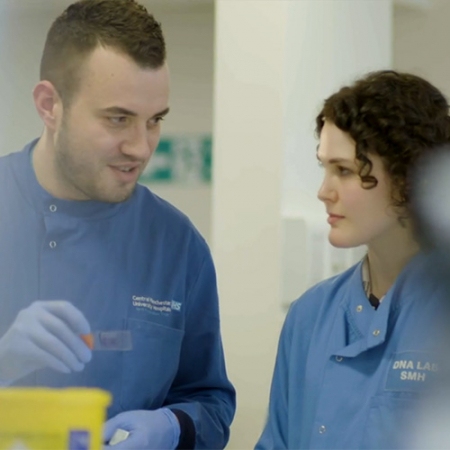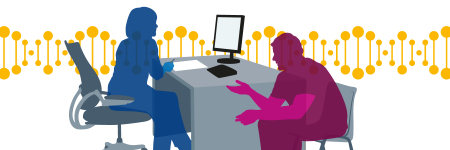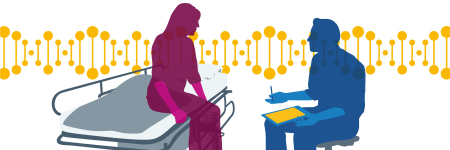Introduction
Alongside other medical specialties, gastroenterology is benefitting from the huge advances made in genomics over recent years. Increasingly, genomic testing and the information it generates underpin diagnosis, treatment and management decisions. An understanding of where and how genomic information can be used, therefore, is important in providing the best care.
In this video, Dr Kevin Monahan discusses the increasing number of applications for genomics, available to all gastroenterologists, in more detail.
What do I need to know?
Why is genomics important in gastroenterology?
Thanks to advances in technology and understanding, genomic testing is more accessible, and genomic information more applicable, in this specialty than ever before.
Genomic testing increasingly forms part of routine care. For example, the NICE guidelines published in 2017 recommended that all new colorectal cancer patients are tested for features suggestive of Lynch syndrome.
As well as a role in the management of inherited conditions, genomics is increasingly relevant to the management of common conditions such as inflammatory bowel disease, too.
Genomics is key to managing families. It is estimated that for every person diagnosed with a hereditary condition, three to four of their close relatives will also be diagnosed if tested.
Genomics is an active area of research and new genes and pathways underpinning disease are being identified all the time. This will inevitably result in the development of new targeted treatments.
How is genomics used in gastroenterology?
Diagnosis
Hereditary diseases
Diseases that run in families are diagnosed via genomic testing. Screening and management measures can then be introduced to protect these individuals from the development or progression of disease, as far as possible.
The diagnosis of a hereditary disease in one family member also opens up the possibility of ‘cascade testing’, meaning other family members can be tested, too. The ripple effect of a genetic diagnosis can therefore be very significant.
Common conditions
An individual’s genetics can increase their risk of developing a specific disease, even when they do not have an inherited condition/susceptibility.
Genome-wide association studies have revealed a range of genetic risk factors that can influence susceptibility to a given disease, for example diabetes, coeliac disease or inflammatory bowel disease (IBD).
We are only at the beginning of understanding these genetic risk factors, but in some instances we can use this information in a clinical setting. A good example is the HLA typing of those with suspected coeliac disease, which can in many cases rule out coeliac disease and enable the patient to continue to eat gluten.
Targeted treatment and management
When a precise genetic diagnosis is made, treatment and management can often be altered accordingly.
Cancer
Chemotherapy with 5-fluorouracil is usually offered to people with colorectal cancer who require systemic treatment, but it may be less effective in people with Lynch syndrome. Avoiding this chemotherapy may therefore avoid unnecessary toxicity. Conversely, newer immunotherapy agents such as checkpoint inhibitors are only effective in those with Lynch syndrome or those with Lynch-like tumours.
The approach to surgical management of colorectal cancer may also be adapted, with extensive resection often favoured in people with Lynch syndrome, who are at higher risk of recurrence than others.
Infectious disease
As an example in another field, when patients are referred with suspected hepatitis C, the genotyping of the hepatitis C virus (HCV) is a vital tool in the selection of antiviral therapy. Because there are seven distinct genotypes and more than 67 subtypes of HCV, genotype information is helpful in defining the epidemiology of hepatitis C and recommending appropriate treatment with direct-acting antiviral (DAA) and/or interferon therapy.
Preventing adverse drug reactions
An individual’s genetics play a part in how they respond to certain drugs (this is known as pharmacogenomics).
Our understand in this area is growing, but one good example in current use is the selection of azathioprine for people with IBD. Because of variation in the TPMT gene, people can have very different reactions to this drug – some serious and hazardous. Genetic testing is used to determine whether the use of thiopurines should be avoided, and what dose may be most effective for a particular individual.
Research
Drug development/novel therapies
Genome-wide association studies (GWAS) have enabled the identification of genetic risk factors for common conditions that affect the GI tract. Thanks to genomic research, increased understanding of the mechanistic role of these genetic risk factors is opening up the possibility of new targeted therapies.
As an example, an important recent discovery has been made in the gene that makes the interleukin 23 receptor, and this is leading to the development of novel therapies. The IL23R gene is involved in the differentiation of the Th-17 lymphocytes, resulting in dysregulated cytokine production, which is implicated in the pathogenesis of Crohn’s disease. Ustekinumab, through inhibition of IL-12 and IL-23, inhibits key molecules in cellular immunity, and is effective in the induction and maintenance of remission of Crohn’s disease.
Polygenic risk scores
Genomic studies have also enabled us to understand more about genetic risk factors that increase or decrease all of our risk of developing certain common conditions, whether diabetes, coeliac disease or IBD. When these individual factors are combined they create a disease risk profile, ranging from low to high risk, unique to an individual. This is known as a polygenic risk score. We are only at the beginning of understanding this, but are starting to use it in clinical practice and it is an area that is sure to develop.
Holistic understanding
Research using genomic data is enabling deeper understanding of the whole picture of disease. For example, GWAS have resulted in a greater appreciation of the role of the microbiome and host immune system in IBD. Common risk-associated alleles have been associated with features of gut immunity, including autophagy and gut mucosal barrier function, highlighting the complex interaction between the host immune system and the gut microbiome in the pathogenesis of IBD.
How can I play my part?
There is a need to improve access to genomic testing and to reduce inequalities in the UK in the diagnosis and care of patients with hereditary cancer. Following the 100,000 Genomes Project, gastroenterologists now have access to genomic testing through the new national test directory as part of the NHS Genomic Medicine Service. All patients who are eligible and could benefit should be referred for testing.
Support is available with ordering genomic tests and interpreting results, but there is a requirement for all gastroenterologists to understand more about genomics in order to ensure as many patients as possible may benefit:
- Understand which patients testing could benefit: know when to ‘think genomics’
- Know how to take a family history and when and how to refer for testing or specialist advice.
- Familiarise yourself with the testing process and the genomic test report.
- Understand how, and in what instances, treatment and management can be tailored to a genomic test result.
- Keep an eye on developments in genomics and the emergence of new therapies and approaches.
- Feel confident to discuss genomics and its implications with patients and families.
It’s important, especially as our knowledge develops, to consider genomics in common disease and not just rare hereditary conditions.
Case example: Lynch syndrome
- A woman of 40 years of age is referred because of her deceased mother’s personal history, and her mother’s wider family’s history, of cancer.
- A few years previously, the woman had had a colonoscopy but was discharged as nothing was found.
- On this occasion, thinking genomics, we review her mother’s medical history, and then arrange retrospective testing of 15-year-old formaldehyde-preserved tissue for features which would correlate with a diagnosis of Lynch Syndrome, which are identified.
- Genetic testing is ordered for a living family member in Ireland with a diagnosis of cancer.
- A diagnosis of Lynch syndrome is confirmed.
- The patient and four other family members are subsequently diagnosed with Lynch syndrome, and are under a regular colonoscopic surveillance programme and taking aspirin as a preventative measure for cancer.
Lynch syndrome is a condition that can increase the risk of developing cancer to 70% within a person’s lifetime, but often at an early age. Recognition and appropriate testing can lead to preventative strategies being employed, not only in the patient, but also in the wider family. Thus it has the potential to improve many lives.
Case example: Coeliac disease
- A patient was diagnosed with coeliac disease on the basis of duodenal biopsies taken during an upper GI endoscopy in a patient with indigestion. Notably, inflammation associated with H pylori was also identified during the same procedure.
- Blood serology was normal. Initially, this was felt to be a seronegative form of coeliac disease, and she was advised to commence a lifelong gluten-free diet, which she could not easily tolerate.
- The patient had little improvement in her symptoms. HLA typing was arranged and indicated that she was not genetically susceptible to coeliac disease, so she was advised to resume eating gluten.
- After identification of a resistant strain of H pylori, she underwent successful treatment with second line therapy.
In this case, HLA typing was invaluable in ruling out susceptibility to coeliac disease and avoiding a lifetime of restricted eating, as well as offering a suitable therapy which resolved her symptoms.
Learning opportunities
Teaching aids
Clinical resources
Identifying patients
Activity: Taking and drawing a genetic family history
Equip yourself with the knowledge and skills to construct a genetic pedigree.
Activity: Recognising the clinical clues of a genetic condition
Familiarise yourself with the clinical features of a range of genetic conditions
Clinical management
Activity: Support decision-making in a consultation
Equip yourself with the knowledge of a range of genetic conditions and the genomic tests available.
Activity: Signpost your patients to further support
Patient groups and charities can offer vital support and guidance for patients, both pre-and post-diagnosis.













